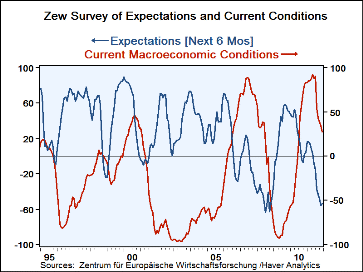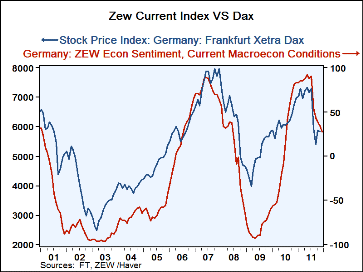 Global| Dec 13 2011
Global| Dec 13 2011Zew Index Stops Retreating: Pyrrhic Victory
Summary
There is a little good news in the Zew survey but it is still very little. The expectations index has stopped falling in December but its rebound is so slight it is hardly detectable on the graph. Moreover, with the expectations index [...]
 There is a little good news in the Zew survey but it is still very little. The expectations index has stopped falling
in December but its rebound is so slight it is hardly detectable on the graph.
There is a little good news in the Zew survey but it is still very little. The expectations index has stopped falling
in December but its rebound is so slight it is hardly detectable on the graph.
Moreover, with the expectations index in the bottom 3% of its historic ordered queue (weaker than its current value only 3% of the time) the slight rebound is hardly much to cheer about. The current index continues to unravel. Here the bottom is a much more distant way away as it stands at a reading of 21% and is weaker than its current value about 79% of the time putting it still near the top 20% of its range.
So the German economy has slipped and expectations have been crushed but the actual economic situation, while off its bloom, is still relatively solid. Of course the ongoing deterioration and trend for the economy is in distress. But so far the reading for the current index suggests that Germany is having still a rather prosperous time but the dank expectations reading tells us that this is not expected to last.
Indeed, the current index still fell sharply this month, shedding 7.4 points, a faster decline than the 4.2 points it lost in November. So despite the rebound in expectations the current situation remains fluid and is deteriorating rapidly. Over the past 12 months the current index has lost 58.1 points thus the drop has averaged 4.8 points per month, just about the drop we saw in November. But the December drop of 7.4 points is a much more severe loss at a pace stepped up by about 50%.
There is not much in the Zew report to like despite the slowdown in the drop of the headline which actually is running into technical constrains since it cannot mathematically decline beyond a reading of -100. Its own historically-experienced range suggests that the potential downside is even more limited than that since the weakest reading on record is -63.9. The gap between the raw reading of the expectations index and the raw current reading (E-C) is about as wide as it ever gets to the downside. That implies that any further current weakness is liable to drag expectations lower as well.
Zew participants’ stock market profitability expectations across the whole of the German stock market segments have slowed their descent but continue to slip modestly and are doing so near the bottom of their historic range. Only banking insurance and construction sectors saw improvement in their expectations this month compared to November.
Although the German bond market is the strongest in Europe its assessment continues to be cut by the German financial experts. It was during this survey period that a Bund auction was undersubscribed compared to the amounts that Germany had expected to sell. The rating on bonds is the worst since April of 2011. It clear is reflecting some of the concerns in the Euro-Area itself
 As for German stocks the Zew survey suggests that they track the current economy more than they look ahead to the future.
The German stock market is not much of a discounting mechanism at least when put against the Zew expectations index.
The correlation between the Zew current index and the DAX is 0.68 while the correlation with the Zew expectations index
and the DAX is -0.25. Then again since this is a survey of financial experts, maybe it is the other way around: when
stocks get weaker the financial experts see the economy as more depressed. The chart is not clear in that as
sometimes the stock market seems to go first and sometimes the Zew current reading seems to go first. In any
even the Zew current index and the German stock market are historically consistent in their assessment of what is
going on. We would be wary, however, that the expectations index is still much, much, lower.
As for German stocks the Zew survey suggests that they track the current economy more than they look ahead to the future.
The German stock market is not much of a discounting mechanism at least when put against the Zew expectations index.
The correlation between the Zew current index and the DAX is 0.68 while the correlation with the Zew expectations index
and the DAX is -0.25. Then again since this is a survey of financial experts, maybe it is the other way around: when
stocks get weaker the financial experts see the economy as more depressed. The chart is not clear in that as
sometimes the stock market seems to go first and sometimes the Zew current reading seems to go first. In any
even the Zew current index and the German stock market are historically consistent in their assessment of what is
going on. We would be wary, however, that the expectations index is still much, much, lower.
| ZEW Economic Index For Germany | |||||||
|---|---|---|---|---|---|---|---|
| Level of Zew Index | Averages | ||||||
| Dec-11 | Nov-11 | Oct-11 | Yr Ago | 3-Mo | 6-Mo | 12-Mo | |
| Current | 26.8 | 34.2 | 38.4 | 82.6 | 33.1 | 47.9 | 67.2 |
| Expectations | -53.8 | -55.2 | -48.3 | 4.3 | -52.4 | -42.2 | -17.2 |
| Percentiles | |||||||
| Current | 65.9 | 69.8 | 72.1 | 95.3 | |||
| Expectations | 6.6 | 5.7 | 10.2 | 44.4 | |||
| Percentiles are readings in this period as percentile of the full range of values back to 1/92 | |||||||
| Count Percentiles: reading is stronger than this 'XXX' percent of the time… | |||||||
| Current | 21.0% | 17.7% | 16.5% | 1.8% | |||
| Expectations | 97.0% | 97.8% | 96.1% | 73.8% | |||
Robert Brusca
AuthorMore in Author Profile »Robert A. Brusca is Chief Economist of Fact and Opinion Economics, a consulting firm he founded in Manhattan. He has been an economist on Wall Street for over 25 years. He has visited central banking and large institutional clients in over 30 countries in his career as an economist. Mr. Brusca was a Divisional Research Chief at the Federal Reserve Bank of NY (Chief of the International Financial markets Division), a Fed Watcher at Irving Trust and Chief Economist at Nikko Securities International. He is widely quoted and appears in various media. Mr. Brusca holds an MA and Ph.D. in economics from Michigan State University and a BA in Economics from the University of Michigan. His research pursues his strong interests in non aligned policy economics as well as international economics. FAO Economics’ research targets investors to assist them in making better investment decisions in stocks, bonds and in a variety of international assets. The company does not manage money and has no conflicts in giving economic advice.
More Economy in Brief
 Global| Feb 05 2026
Global| Feb 05 2026Charts of the Week: Balanced Policy, Resilient Data and AI Narratives
by:Andrew Cates






